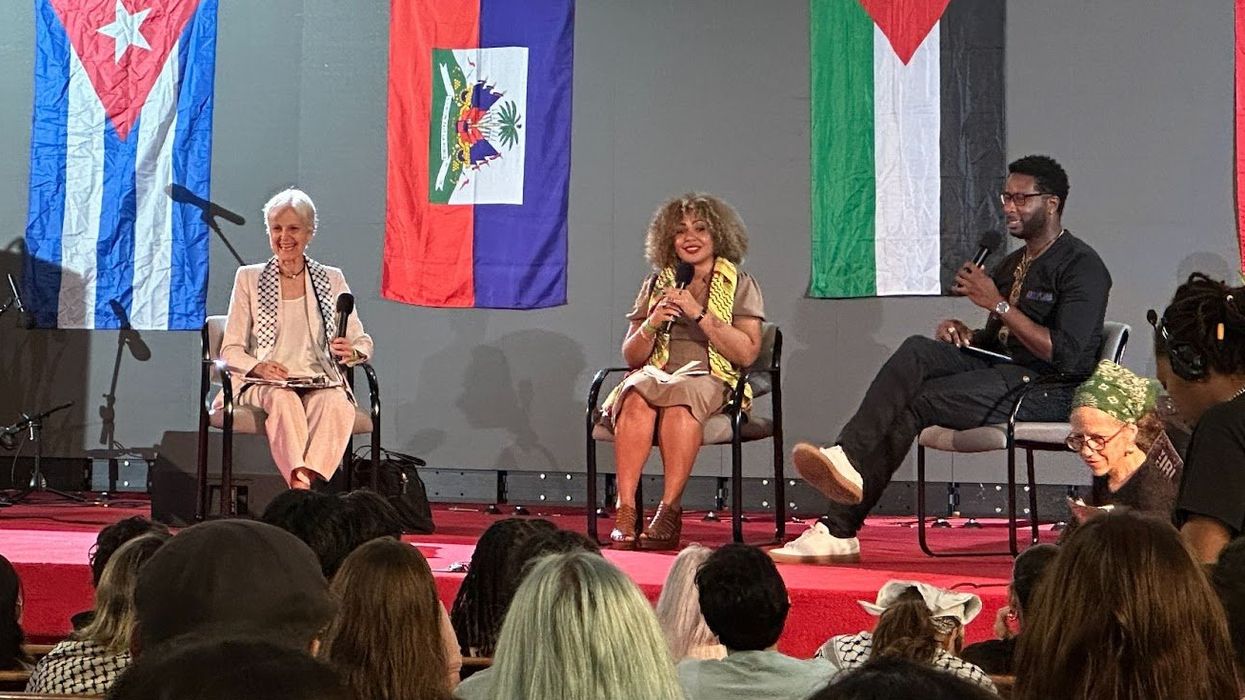Hoffman is a graduate student at Northwestern University’s Medill School of Journalism.
This article is part of a week-long series on the Democratic National Convention, written by graduate students at Northwestern University's Medill School of Journalism who are covering the four-day convention in Chicago.
CHICAGO — The Democratic National Convention is underway and thousands of delegates and visitors have converged on the city to support the party’s presidential ticket of Vice President Kamala Harris and Minnesota Gov. Tim Walz.
But Democrats do not have Chicago to themselves this week.
Third-party candidates also came to the city, to offer hope to undecided voters looking for greater political change than they believe the two major parties offer. Seeing an opportunity to discuss everything from expansive environmental and economic policies to free universal health care and an immediate ceasefire in the Israel-Gaza war, candidates Jill Stein and Claudia De La Cruz expanded on their platforms just as Democrats were starting to settle in for the week.
On Sunday, the Green Party’s Stein and De la Cruz, of the Party for Socialism and Liberation, spoke at the Chicago People’s Assembly, a daylong event at the Rainbow Push Coalition’s headquarters. They took to the stage in the building’s auditorium and argued that the two major parties aren’t entitled to anyone’s vote, but instead candidates and parties need to earn support by aligning with voters’ values.
“This is nothing but the propaganda of the war machine and Wall Street and their political parties who are trying to shame and blame not only the candidates, but the people who are standing up for the democracy that we deserve,” Stein said. “Politicians have to earn your vote, no one owns your vote.”
The candidates said they understand the common refrain that voting for a third party equates to wasting a ballot. But Stein believes third parties incentivize marginalized people to interact with our democratic processes.
“As third parties, as independent non-corporate politics, we do not take votes away. We give people a reason to come out and vote who otherwise won’t vote,” Stein said.
De la Cruz said Harris’ record should persuade undecided voters to look elsewhere.
“She’s been in the leadership of the Democratic Party and the positions that she’s taken is to lock up our people, to criminalize and dehumanize people on the border and she is actively supporting genocide,” De la Cruz said. “What makes us think that she will be the one who will bring relief to any one of us in the West Side and the South Side of Chicago, in the Bronx or any other community?”
Hundreds of people gathered for the Chicago People’s Assembly, which included sessions on topics such as defending LGBTQ and women’s rights and ending the war on Black American by combating police repression.
Stephanie Sturgeon attended these sessions. She is a Chicago math teacher who started voting for third-party candidates in 2016 because she felt their values aligned more closely with her own and their campaigns were run with an emphasis on individual issues.
For people struggling to decide on a candidate, Sturgeon suggests looking beyond the Democratic and Republican parties, as well as not allowing oneself to be shamed into voting for those parties’ candidates.
“Stop listening to the media platforms who are telling us that there’s only two candidates and that if you don’t go for one or the other, that you’re the problem. The people are never the problem, the rulers are always the problem in this country,” Sturgeon said.
Sam Schaefer is a member of the Detroit Party for Socialism and Liberation. He came to Chicago to raise awareness for De la Cruz and the PSL. He understands that third parties don’t have the strength to win a presidential election, but that events like these continue the process of building power.
“This event today is about building people’s power for alternative candidates,” Schaefer said. “When people’s power is built, it affects the capitalist system, and it affects the billionaires that are funding those other campaigns. That’s when people power can really command political attention.”
Angelina McAdory is a 24-year-old graduate student at DePaul University in Chicago studying women and gender studies and social work. She works at Healthy Hood, a Chicago nonprofit helping underserved communities increase life expectancy. That group, along with the PSL, organized the event.
She voted for the Biden-Harris ticket in 2020, but quickly became jaded by both major parties and now recommends voting for third parties.
“I would never advise not voting. Voting is one of the ways we as people in the belly of the beast can engage with our system,” McAdory said.



















 From left to right: Gabriel Cardona-Fox, Bud Branch, Joe Concienne
From left to right: Gabriel Cardona-Fox, Bud Branch, Joe Concienne 